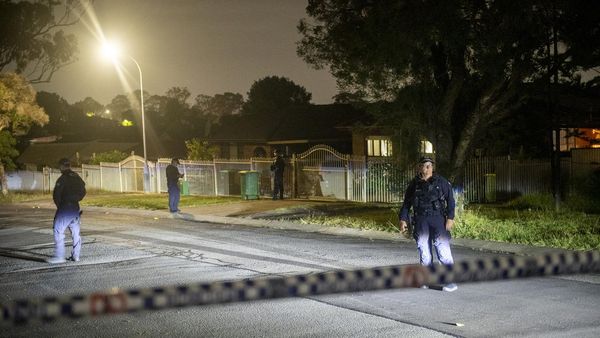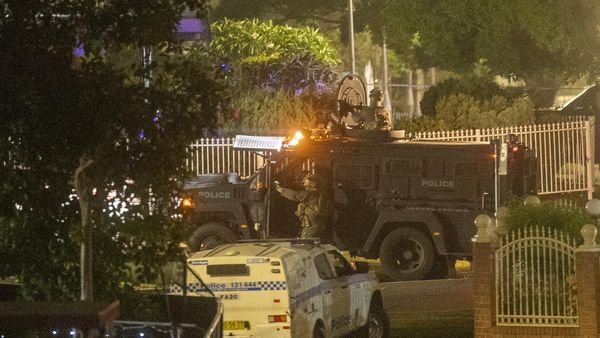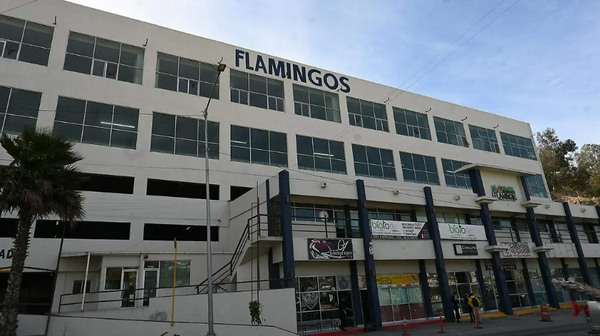
This material was originally published as the Murals and Mosaics newsletter on Sept. 29, 2023. Sign up for the newsletter here.
A decades-old mural at 71st Street and Jeffery Avenue that was done by the late, revered artistic duo Mitchell Caton and Calvin Jones has been described as “a masterpiece” with its presence “like having a Van Gogh on the block.”

But the artwork, celebrating Black creativity, was almost lost to history last month when another artist showed up at the wall and began using a roller and fresh paint to cover up the piece, prepping the space for a totally new mural that he thought he had permission to create.
Only quick action by a local business leader stopped him and saved most of the images — which had been painstakingly restored over the preceding weeks by local artists Dorian Sylvain, Damon Lamar Reed and Bernard Williams to make it accessible for another generation.
When Sylvain heard what’d happened, she says, “My heart dropped.”

“It’s one of the oldest murals in the city,” says Sylvain. And this happened “right after we finished revitalizing it.”
She estimates roughly 10% of the artwork — titled “Builders of the Cultural Present” and originally completed in 1981 — was covered with a “yellowy beige” coat of paint.
“The whole thing was just really stunning,” she says. “It took us a minute to digest it.”

The artist who started painting over the piece, Quentin Crockett, says he’d been hired by a local community activist to paint another mural there — highlighting victims of violence — because the last they’d seen the Caton-Jones mural, it was in bad shape. Crockett says he didn’t realize a restoration had been in the works.
“Everybody’s heart was in the right place,” says Crockett, who used to have a studio near the South Shore mural. “Nobody was trying to vandalize or destroy anything. . . . I was caught in the middle as an artist.”
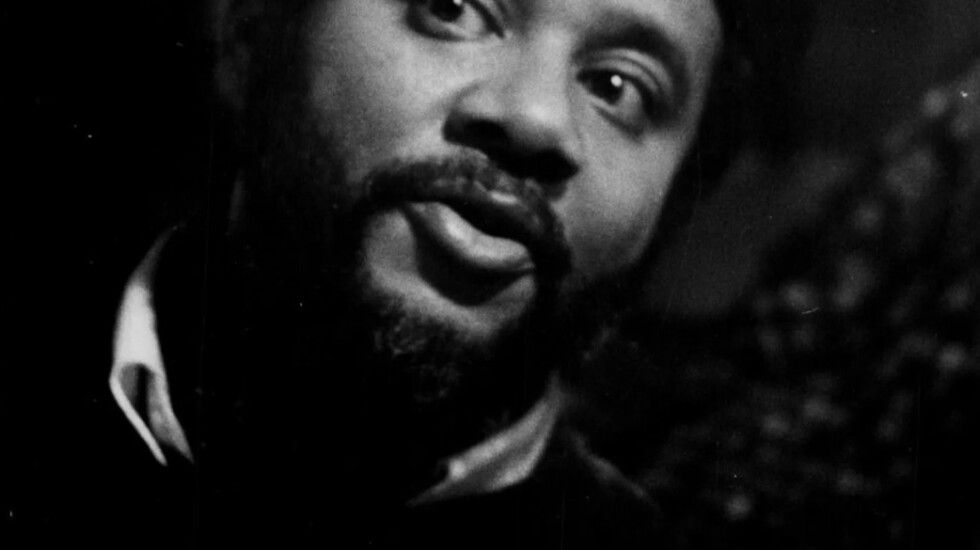
Sylvain and her collaborators soon returned to the wall and began piecing the artwork back together.
The mural, the restoration, the repairs and the craziness are the focus of this week’s “Murals and Mosaics” story in the Chicago Sun-Times done with help from our esteemed contributor Jeff Huebner (whose writing and reporting helped with this dispatch as well.) Click here to read more.

If you’re looking for a little context about Caton and Jones, they created six murals together between 1976 and 1987. They used brushes, in contrast to the spray paint popular today with street artists.
The first of those, called “A Time to Unite,” is at 41st Street and Drexel Avenue and intended to serve as a call for racial solidarity and fighting inequities.
The most recent, “Bright Moments, Memories of the Future,” is on the exterior of the now-closed Avalon Regal Theater at 79th Street and Stony Island Avenue on the border of the South Side neighborhoods South Shore and Avalon Park.
Featuring Black entertainers from Billie Holiday and Redd Foxx to Louis Armstrong and Aretha Franklin, it’s pictured below.

Artist Arlene Turner Crawford assisted on last month’s restoration of “Builders of the Cultural Present,” as well as the Caton-Jones Avalon Regal Theater piece from years ago.
Well, she assisted “until the scaffolding fell on me,” as she recently recalled.
“We were moving the scaffolding . . . it was like a three-story scaffolding. I saw it falling, breaking apart over my head . . . anywhere I moved I saw pieces coming down on me,” she says. “Something hit me, I remember being out for a second.”
She ended up with a broken leg. What a wild story.
Referring to the theater mural, Turner Crawford tells us, “I don’t know if it’s been restored as of yet, but it’s still up there and looking good.”
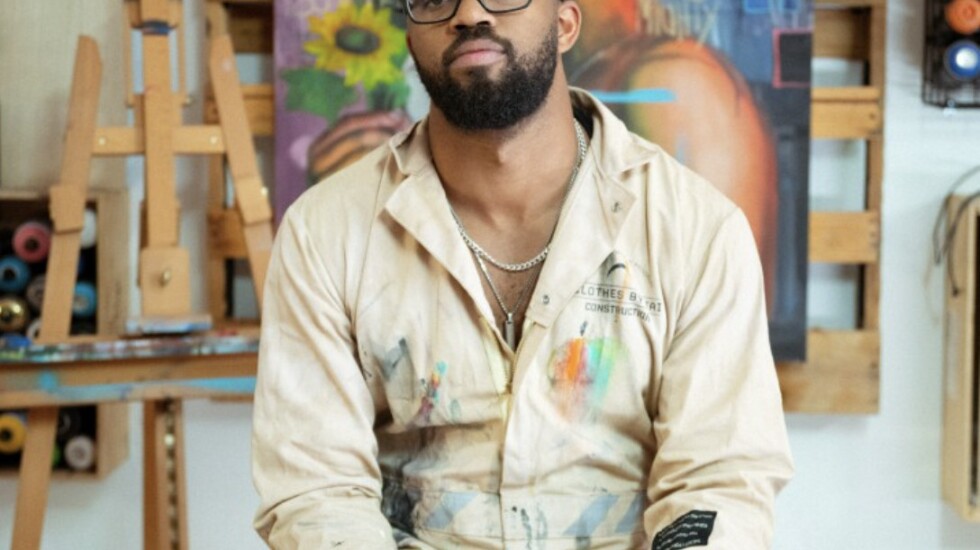
Moving on to another generation of talented Chicago artists, Dwight White II was recently profiled by a WBEZ colleague, and it’s worth a read.
He’s a former Northwestern University football player and current creator of dynamic murals.
“White uses art to pay homage to everyday human experiences,” the article says.
“White’s work showcases the multitudes of Black humanity.”
A Houston native, “White said that creating in Chicago has brought an energy to his art that he hasn’t experienced elsewhere.”
We profiled him a few years back for a giant mural he did in the South Loop.
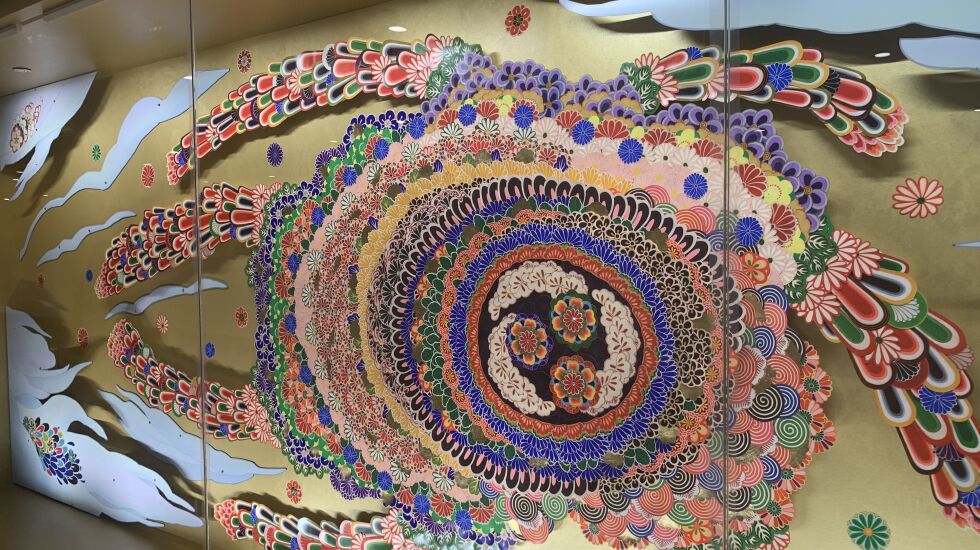
Not all public art is easily accessible, unfortunately.
For instance, the piece shown above was just installed inside O’Hare Airport’s International Terminal, and I happened past it last week while returning from out of town.
The artist is Mayumi Lake, a Chicago artist and Japanese immigrant.
There’s a lot packed into her artwork, literally and figuratively.
First, it’s inspired by Bohemian composer Antonin Dvorak’s “New World Symphony,” which Britannica notes was written in the U.S. and “purportedly incorporated the composer’s reflections on his American setting.”
The title of Lake’s piece is “Shinsekai Yori,” which translates from Japanese to “From the New World.”
That resonates with her as someone who has long called Chicago home but hails from — and still visits — Japan.
She also notes that a lot of travelers passing through O’Hare are likewise from other countries. (More than 19,000 people a day on average walk through the O’Hare corridor where Lake’s creation is located.)
There’s an element of nostalgia or sentimentality.
But in the design, particularly the swirling colors in the center that she calls a “flower cyclone,” there’s also a statement on “the turbulent road for immigrants that they may experience when they move here . . . it’s not easy to adapt to a new culture, a new language.”
That center image, by the way, is made from inkjet paper, “I think 2,500 to 3,000 pieces, hand cut and layered on a wood backing,” she says.
All that being said, Lake says “people come from long flights, and they want to see happy things, people don’t need to understand that whole back story.”
Says a city official, “It is one of the 19 commissions by the Chicago Department of Cultural Affairs and Special Events . . . and the Chicago Department of Aviation . . . as part of the Terminal 5 expansion project. An announcement with more details will be made in the coming days.”

Another O’Hare piece, shown above, was done by a familiar fellow, Bernard Williams.
Titled “Buffalo Chart,” the artwork “is a collection of approximately 150 signs, symbols and objects” that serve as “a reflection on artistic and cultural forms with origins in various parts of the globe,” according to Williams.
“The work borrows forms, shapes and words which might have origins in China, Europe, Asia, the Americas or the Middle East. The work aims to suggest the complexities of the world we live in, calling attention to the similarities and differences among people groups and geographical locations, with some references to specific historical events or human accomplishments.”
Click on the map below for a selection of Chicago-area murals
Thanks for reading the Murals & Mosaics newsletter! Check out other newsletters from the Sun-Times ranging from general morning news to high school sports here.
If you want a copy of our two-year murals/mosaics anniversary magazine, click here, copies are just $4.99 apiece.
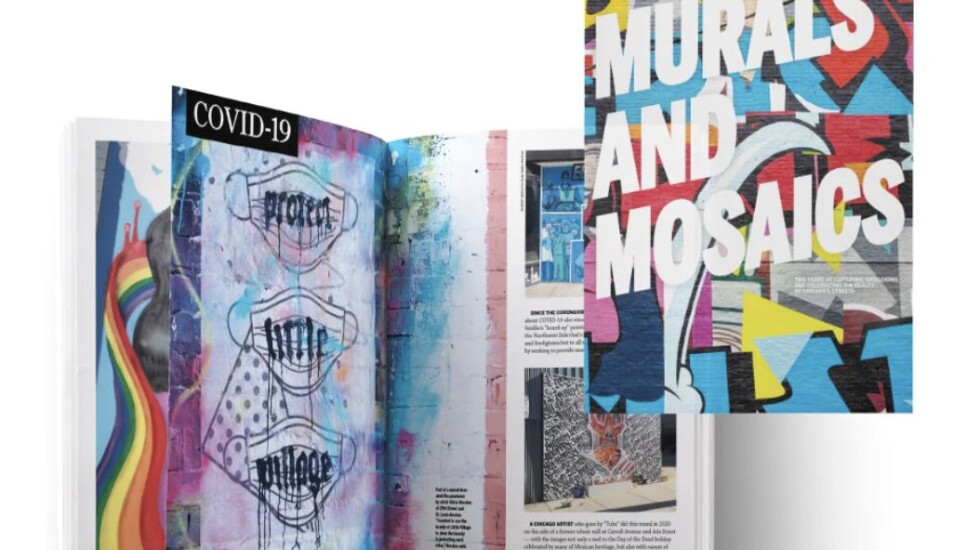
Got a mural or other piece of public art you’d like us to look into? Send an email to murals@suntimes.com and we’ll check it out.
Wanna share with others how to subscribe to this free weekly email newsletter? Here’s the link to sign up.
Have a great weekend!
Robert Herguth, Sun-Times

